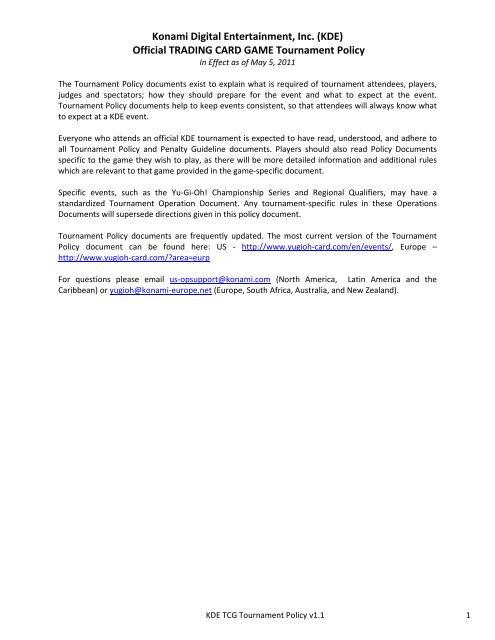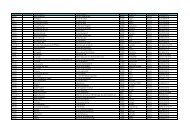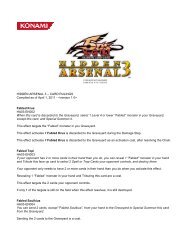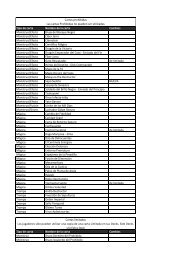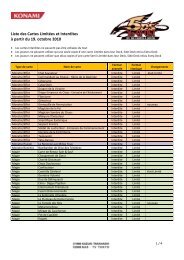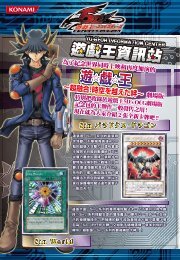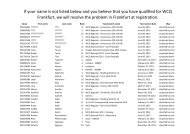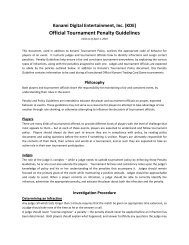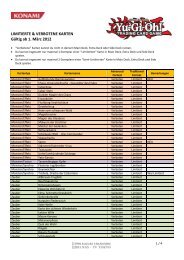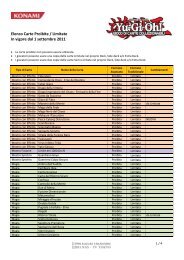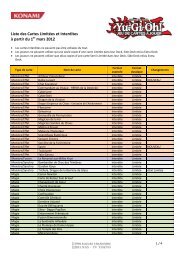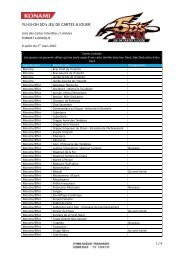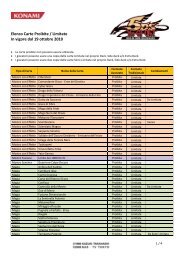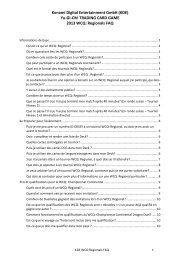KDE TCG Tournament Policy v1.1 - Yu-Gi-Oh!
KDE TCG Tournament Policy v1.1 - Yu-Gi-Oh!
KDE TCG Tournament Policy v1.1 - Yu-Gi-Oh!
Create successful ePaper yourself
Turn your PDF publications into a flip-book with our unique Google optimized e-Paper software.
Konami Digital Entertainment, Inc. (<strong>KDE</strong>)Official TRADING CARD GAME <strong>Tournament</strong> <strong>Policy</strong>In Effect as of May 5, 2011The <strong>Tournament</strong> <strong>Policy</strong> documents exist to explain what is required of tournament attendees, players,judges and spectators; how they should prepare for the event and what to expect at the event.<strong>Tournament</strong> <strong>Policy</strong> documents help to keep events consistent, so that attendees will always know whatto expect at a <strong>KDE</strong> event.Everyone who attends an official <strong>KDE</strong> tournament is expected to have read, understood, and adhere toall <strong>Tournament</strong> <strong>Policy</strong> and Penalty Guideline documents. Players should also read <strong>Policy</strong> Documentsspecific to the game they wish to play, as there will be more detailed information and additional ruleswhich are relevant to that game provided in the game-specific document.Specific events, such as the <strong>Yu</strong>-<strong>Gi</strong>-<strong>Oh</strong>! Championship Series and Regional Qualifiers, may have astandardized <strong>Tournament</strong> Operation Document. Any tournament-specific rules in these OperationsDocuments will supersede directions given in this policy document.<strong>Tournament</strong> <strong>Policy</strong> documents are frequently updated. The most current version of the <strong>Tournament</strong><strong>Policy</strong> document can be found here: US - http://www.yugioh-card.com/en/events/, Europe –http://www.yugioh-card.com/?area=eurpFor questions please email us-opsupport@konami.com (North America, Latin America and theCaribbean) or yugioh@konami-europe.net (Europe, South Africa, Australia, and New Zealand).<strong>KDE</strong> <strong>TCG</strong> <strong>Tournament</strong> <strong>Policy</strong> <strong>v1.1</strong> 1
I. Preparing To PlayA. PlayersB. Ineligible PlayersC. Head JudgeD. Floor JudgeE. <strong>Tournament</strong> OrganizerF. ScorekeeperG. SpectatorsH. MediaII.III.IV.Player ResponsibilitiesA. Player ID/COSSY ID NumberB. IdentificationC. <strong>Tournament</strong> MaterialsD. Understand RulingsE. Unacceptable BehaviorF. Communication<strong>Tournament</strong> InformationA. <strong>Tournament</strong> TiersB. SanctioningC. <strong>Tournament</strong> Match StructureD. Number of RoundsE. Publishing <strong>Tournament</strong> InformationF. Reporting<strong>Tournament</strong> RulesA. SportsmanshipB. Bribery & CollusionC. Random OutcomeD. TiebreakersE. Note TakingF. Game StateG. SleevesH. ShufflingI. Marked CardsJ. Proxy CardsK. ConcessionsV. <strong>Tournament</strong> InfractionsA. Slow PlayB. WageringC. CheatingD. Unsporting ConductE. Buying and Selling CardsF. Prohibited ItemsG. Privileged InformationH. Impersonation of <strong>KDE</strong> Employees or RepresentativesI. Suspension<strong>KDE</strong> <strong>TCG</strong> <strong>Tournament</strong> <strong>Policy</strong> <strong>v1.1</strong> 2
I. Preparing To PlayA. PlayersTo participate in a sanctioned <strong>KDE</strong> tournament you need a Konami Player ID card with a COSSY barcodeand number. If you do not have one, you may sign up for one at the event. Do not lose your ID card, as itcannot be replaced. Please note that players at sanctioned <strong>KDE</strong> tournaments will be referred to by theirKonami Player ID number and their first name and last name.You must be in good standing and not on the suspended list to participate in Konami sanctioned events.To remain in good standing, you must adhere to all player responsibilities outlined in this and otherofficial documents. You must meet any age and/or invitation requirements that apply to selectedtournaments. (e.g. Dragon Duel events or National Championships).B. Ineligible PlayersAny tournament official associated with or working an event cannot play in that specific event. Thisincludes, but is not limited to, the Judge Staff, Scorekeeper, and <strong>Tournament</strong> Organizer.Individuals who have been suspended from Official Konami <strong>Tournament</strong>s may not play in sanctionedevents. In addition, suspended individuals are prohibited from entering tournament venues. A list ofsuspended players can be located here http://www.yugioh-card.com/en/events/Individuals who are banned by the rules of the <strong>Tournament</strong> Organizer, venue, or by local law cannotparticipate in official events.Employees of Konami Corporation and their immediate family members (i.e. children, parents, andspouses) cannot play in official events. There may be exceptions made to this rule, in the case of Bountytournaments or other special events, which will be announced beforehand.Employees of partner companies cannot play in official events. These include, but are not limited to, VIZMedia, LLC., 4Kids Entertainment, Inc.Employees of partner companies responsible for Organized Play (e.g. Devir, Amigo Spiel & Freizeit, etc.)cannot play in official events taking place in the market they are responsible for. They may, however,participate in events taking place outside of their market.C. Head JudgeThe Head Judge makes the final call for rulings or policy appeals. He or she requires superior knowledgeof rulings and penalty guidelines. No other individual, including the tournament organizer or a Konamiemployee can overturn a call made by the Head Judge.The Head Judge must be physically present and available during the tournament, to deal with eventissues and answer appeals promptly. The Head Judge must be adequately prepared to make sure thatproper guidelines are followed.The Head Judge should act as a mentor for the event’s staff, and should carefully consider individualjudges’ strengths and weaknesses when building the staff list and assembling teams. Judges should alsoreceive feedback and evaluation from the Head Judge, consisting of compliments on their strengths andsuggestions on how to improve further.<strong>KDE</strong> <strong>TCG</strong> <strong>Tournament</strong> <strong>Policy</strong> <strong>v1.1</strong> 3
F. ScorekeeperThe Scorekeeper is responsible for creating accurate pairings and additional tournament informationthroughout the event.G. SpectatorsSpectating at an event is a privilege, not a right, for tournament attendees. It is a spectator’s duty toremain neutral while observing game play, and to make sure their presence does not disrupt the event.Spectators should not speak to or communicate with players who are currently engaged in a match, inany way. However, if a spectator notices any violation of game play rules or <strong>Tournament</strong> <strong>Policy</strong>, he orshe must alert a tournament official immediately.Spectators must be prepared to move if their presence blocks judge access, throughways, fire exits, orany other paths identified by tournament staff. Spectators will be asked to move if their presence isdistracting to any of the players. If a judge or tournament official instructs a spectator to move, he orshe must comply.H. MediaMembers of the media who wish to attend any sanctioned event to create written, photographic, audio,or video content must contact the <strong>Tournament</strong> Organizer and <strong>KDE</strong> in advance of the event. Mediarepresentatives should be prepared to provide evidence of their association with a news outlet orreputable entity in the gaming industry at the beginning of the event or before the event begins.Any member of the media approved to cover an event agrees to provide, as well as assume liability, forall of his or her own equipment and employees. Guests from the media must abide by the same rulesset for spectators, and are expected to defer to tournament officials and <strong>KDE</strong> employees.Members of the media are required to obtain their own written releases from players and/orspectators.<strong>KDE</strong> <strong>TCG</strong> <strong>Tournament</strong> <strong>Policy</strong> <strong>v1.1</strong> 5
II.Player ResponsibilitiesA. Player ID/COSSY ID NumberCOSSY is the global player identification and ranking system used by <strong>KDE</strong>. You must register for a KonamiPlayer ID card with a COSSY barcode and number in order to participate in a sanctioned event. Onceyour ID card has been issued, it is your responsibility to not lose the ID card and/or your COSSY barcodesticker. You will be required to present this information when registering for a tournament. Your ID cardand barcode stickers are yours and may not be used by anyone else for any purpose.After receiving your card, COSSY barcode, and number, you need to register your number online athttps://www.cossy.konami.net. Until you register your number with your personal information, yourranking cannot be tracked. (Please note you must use https: and not http:).You are responsible for the maintenance of your own COSSY information. This includes keeping contactinformation up to date, as well as regularly reviewing your tournament history for accuracy. Note thatKonami cannot recover your password or ID number if you lose or forget them – only you may accessyour COSSY account.You may register for only one Konami Player ID at a time. If the ID card or barcode is lost, that IDnumber cannot be replaced. You should consider keeping a photocopy, digital picture, or scan of yourbarcode, so that you can print out a new one in the future if necessary.If you have questions about your COSSY ID that are not covered above, please contactus-opsupport@konami.com.B. IdentificationYou should be prepared to produce personal identification if asked to do so by a tournament official.School ID cards, state ID cards, driver’s licenses, passports and birth certificates are all valid forms ofidentification. You may contact the <strong>Tournament</strong> Organizer ahead of time if you have questions aboutproviding identification.C. <strong>Tournament</strong> MaterialsYou must bring a legal Deck (to constructed events); as well as extra card sleeves, paper and pencils totrack scores and fill out result slips, and any dice, coins, counters or tokens that your Deck requires. Youmay use a calculator to help keep track of score, but must keep a paper record as well to help resolvedisputes.In addition to tournament supplies, you must bring the appropriate entry fee, your Konami Player IDcard and/or COSSY barcode sticker, and personal identification.D. Understand RulingsYou should read and understand the latest version of the rulebook for the game you are playing, as wellas look over rulings that apply to the cards you have included in your Deck. While there will be judges ata sanctioned tournament, you will have a better tournament experience if you prepare yourselfbeforehand by knowing what your cards do, and how the game works.<strong>KDE</strong> <strong>TCG</strong> <strong>Tournament</strong> <strong>Policy</strong> <strong>v1.1</strong> 6
E. Unacceptable BehaviorParticipants in all sanctioned Konami tournaments are expected to display good sportsmanship wheninteracting with other tournament attendees, players, judges, and staff. Rude language, disruptive ordisrespectful behavior, inappropriate clothing, unwarranted accusations, and disregard for the safety ofothers or the condition of the venue will not be tolerated. You should read the Penalty Guidelinedocument before attending an event, to better understand how you are expected to behave.If an attendee arrives at an event intoxicated, or becomes so during the course of the event, he or shewill be disqualified and removed from the venue and will be subject to additional penalties.F. CommunicationIt is your responsibility to relay accurate information at all times. You should clearly communicate youractions during game play, and ask questions of your opponent or a tournament official if you are unsureabout something. You are obligated to notify an opponent if he or she fails to follow any game rules,including effects he or she may be playing incorrectly.<strong>KDE</strong> <strong>TCG</strong> <strong>Tournament</strong> <strong>Policy</strong> <strong>v1.1</strong> 7
III.<strong>Tournament</strong> InformationA. <strong>Tournament</strong> TiersThere are two tiers of tournaments in <strong>KDE</strong> Organized Play:Tier 1 – Casual: This encompasses Hobby Store level events, Pegasus League, and Duelist League.Tier 2 – Competitive: This encompasses Regional Qualifiers, <strong>Yu</strong>-<strong>Gi</strong>-<strong>Oh</strong>! Championship Series, NationalChampionships, World Championship Qualifiers, and World Championships.Tier 1 events are designed for casual play and light to moderate rules enforcement. <strong>Tournament</strong> <strong>Policy</strong>and Penalty Guidelines apply at these levels, but the focus is on fostering a friendly and fun atmospherefor players to play in.Tier 2 events are prestigious events, and will have the highest level of rules and penalty enforcement.B. SanctioningOnly Official Konami <strong>Tournament</strong> Stores and approved <strong>Tournament</strong> Organizers may sanction KonamiTrading Card Game tournaments. A <strong>Tournament</strong> Organizer must register for an official tournament with<strong>KDE</strong> no later than one day prior to the day of the tournament before it becomes a sanctionedtournament. <strong>Tournament</strong> Organizers must keep all tournament records for 6 months after atournament’s completion date, which includes keeping backup copies or printed copies of thetournament details.At least four players must compete in order for an event to be sanctioned.C. <strong>Tournament</strong> Match StructureA tournament can be organized as a single-elimination event or as an event using Swiss Rounds.Single Elimination tournament – Half of the tournament is eliminated after each round – the losingplayer is out of the tournament, while the winner goes on to the next round. This continues until onlyone player remains, who is then declared the winner.Swiss Round tournament – Players are paired off based on each player’s win/loss record. Players are noteliminated when they lose a match during Swiss tournaments – instead, they will continue to be pairedagainst players with similar records for all remaining rounds of the event. A player may choose to dropfrom a Swiss tournament at any time by either filling out the proper information on a match result slipor by notifying the official scorekeeper prior to the pairing of the following round.D. Number of RoundsThe number of rounds played in a Konami sanctioned tournament is based on the total number ofplayers enrolled in the event. If specific operations documents have been provided for an event, anyround information set forth within that operations document will take precedence.<strong>Tournament</strong> Organizers may run events with no top cut, provided that information is advertised beforethe start of the event. The number of rounds and cut (if any) must be advertised before the start of theevent, and cannot be changed afterwards. If a tournament operations document specifies that a Top Cutmust be performed, TOs may not deviate from that document.<strong>KDE</strong> <strong>TCG</strong> <strong>Tournament</strong> <strong>Policy</strong> <strong>v1.1</strong> 8
• 4 – 8 Players = 3 Rounds of Swiss followed by a cut to Top 2• 9 – 16 Players = 4 Rounds of Swiss followed by a cut to Top 4• 17 – 32 Players = 5 Rounds of Swiss followed by a cut to Top 4• 33 – 64 Players = 6 Rounds of Swiss followed by a cut to Top 8• 65 – 128 Players = 7 Rounds of Swiss followed by a cut to Top 8• 129 – 256 Players = 8 Rounds of Swiss followed by a cut to Top 8• 257 – 512 Players = 9 Rounds of Swiss followed by a cut to Top 16• 513 – 1024 Players = 10 Rounds of Swiss followed by a cut to Top 16• 1025 – 2050 Players = 11 Rounds of Swiss followed by a cut to Top 32• 2051 or More Players = 12 Rounds of Swiss followed by a cut to Top 32E. Publishing <strong>Tournament</strong> Information<strong>KDE</strong> reserves the right to publish event information such as a player’s Deck List, photographs, interviewsor video reproduction of any official Konami Trading Card Game tournament.F. ReportingIt is a <strong>Tournament</strong> Organizer’s responsibility to report sanctioned tournament details to Konami viaCOSSY or Konami <strong>Tournament</strong> Software export within one week of the tournament’s completion.<strong>KDE</strong> <strong>TCG</strong> <strong>Tournament</strong> <strong>Policy</strong> <strong>v1.1</strong> 9
IV.<strong>Tournament</strong> RulesA. SportsmanshipPlayers are expected to be respectful and behave in a polite manner towards all tournament attendees,players, judges, tournament officials, and spectators. Players who engage in unsporting conduct orbehavior that endangers or detracts from the event, will be removed from the venue. Players shouldread the <strong>KDE</strong> Official Penalty Guidelines for a better understanding of acceptable behavior attournaments.B. Bribery & CollusionThe outcome of a match may not be influenced by any outside incentives or additionalprizes/compensation. Offering or accepting a bribe is forbidden.C. Random OutcomePlayers may not randomly determine an outcome of a match, such as flipping a coin or rolling a die.D. TiebreakersThe following are the tiebreakers used to determine a player’s ranking in the tournament.1. Match Wins2. Opponents’ match-win percentage3. Opponent’s opponents’ match-win percentageE. Note TakingNote taking is not allowed in <strong>KDE</strong> sanctioned tournaments, with the following exceptions:- Players in sanctioned <strong>Yu</strong>-<strong>Gi</strong>-<strong>Oh</strong>! <strong>TCG</strong> tournaments should keep a record of both players’ LifePoints for each game.- Tracking of mandatory effect reminders.- Tracking of turns and turn counters.These notes should be taken quickly, so as not to disrupt the flow of the game.F. Game StatePlayers are responsible to accurately represent the game state at all times, and truthfully answerquestions about any aspect of the game state that is considered to be public knowledge.Both players must indicate to one another all components of their Deck. Depending upon the game, thiscan include a Main Deck, Side Deck, and Extra Deck.Cards should be laid out according to the pattern established by a game’s Game Mat. Players should notcreate their own layouts. All cards, including in-play cards, Decks, etc., should be kept in theirappropriate areas.<strong>KDE</strong> <strong>TCG</strong> <strong>Tournament</strong> <strong>Policy</strong> <strong>v1.1</strong> 10
If a player requires tokens or counters, the player should use a sufficient quantity of tokens or countersto accurately represent each game effect. Players should never use any object (including cards) for atoken or counter if it could be mistaken for another game element.Scorekeeping for the game must be done in view of both players.Keep your hands and cards visible and above the table at all times.G. SleevesA player may choose to use plastic card sleeves to protect their cards during the course of a tournament.All sleeves must be identical in terms of color, wear, and design, and all cards must be placed intosleeves in the same direction and manner. Players may not “double sleeve” their decks. If a playerchooses to use sleeves, they may only have one sleeve per card.At Competitive Level events, the quality of player’s sleeves will be held to a higher standard. Any sleeveswith noticeable patterns or wear may be subject to penalties. Sleeves with highly reflective backs arenot allowed.Sleeves with excessive wear, noticeable patterns, or other identifying characteristics may be disallowedby the Head Judge. If you have a question about the legality of your sleeves, the Head Judge is the finalarbiter as to whether or not your sleeves can be used in that tournament.H. ShufflingA player’s Deck must be randomized by using an accepted shuffling method (riffle, pile, Hindu, etc.) andthen cut. This must be done at the start of every game, and whenever a game mechanic requires theplayer to shuffle their Deck.Each player must thoroughly randomize (shuffle) their Deck where the opponent can see.• A player cannot check or order the cards when shuffling• A player cannot pre-sort their Deck (sorting Monsters/Spell/Trap, etc.)After the Deck is thoroughly randomized, it must be presented to the opponent. The opponent mustrandomize (shuffle) the Deck further and then return it to the original owner.The owner may then “cut” their Deck. If they do, they must present it to the opponent who must “cut” theDeck again and then present it back to the original owner. No additional randomization may be done tothe Deck after this point.By presenting your Deck to your opponent, you agree that you have sufficiently randomized your Deck.I. Marked CardsA card is considered to be marked if it can be identified without seeing the front of the card. Thisincludes warping, discoloration, and water-marks, or if the cards are sleeved, sleeves with identifyingmarks or other unique characteristics that separate it from other cards in the Deck.If players are using sleeves to protect their cards, they should take extra precautions to ensure that theirsleeves do not become marked during the course of a tournament. The Head Judge may require a playerto re-sleeve their Deck should they feel that the sleeves are marked.<strong>KDE</strong> <strong>TCG</strong> <strong>Tournament</strong> <strong>Policy</strong> <strong>v1.1</strong> 11
The Head Judge may require a player to replace a marked card(s) during the course of a tournament. Ifthe player cannot replace the card(s) before their next match begins, appropriate tardiness penalties atthree minutes and ten minutes will begin to apply, as the player no longer has a Deck that matches theirregistered Deck list.If they cannot replace the card(s), or choose not to replace the card by the 10-minute mark in thematch, they will be marked as a no-show and dropped from the tournament. If the player does not wishto drop from the tournament, they must notify the scorekeeper.J. Proxy CardsProxies (cards used to represent a different card) are not allowed in sanctioned events. Photocopies,cards that have been relabeled, etc. are considered “proxies” and cannot be used in your Deck in asanctioned tournament.K. ConcessionsA player may concede a game at any time, provided he or she has not been offered or has accepted anysort of compensation for doing so. Players who concede in exchange for cash, prizes, or other incentivesare guilty of Bribery and Collusion, which violate the Konami Penalty Guidelines.<strong>KDE</strong> <strong>TCG</strong> <strong>Tournament</strong> <strong>Policy</strong> <strong>v1.1</strong> 12
V. <strong>Tournament</strong> InfractionsA. Slow PlayThis category covers infractions associated with the pace of a player’s game. Players are expected toplay at a reasonable speed, regardless of the complexity of the game situation. Stalling is neveracceptable.B. WageringPlayers and tournament officials may not wager or bet on the outcome of any matches or games in anofficial Konami Trading Card Game <strong>Tournament</strong>.C. Cheating<strong>KDE</strong> holds a zero-tolerance policy towards cheating. If a player is discovered to have cheated in anevent, the Head Judge will issue a disqualification and will send their report to the <strong>KDE</strong> PenaltyCommittee. The <strong>KDE</strong> Penalty Committee will then review the incident and determine if any additionalpenalties are required.D. Unsporting ConductPlayers who engage in unsporting conduct or behavior that endangers or detracts from the event, willbe removed from the venue and be subject to additional penalties.E. Buying and Selling Cards<strong>Tournament</strong> attendees should familiarize themselves with the rules on buying, selling, and trading ateach venue. Many venues do not allow attendees to buy and sell from one another, and attendees whoviolate this policy may incur a penalty.Predatory trading practices (targeting inexperienced or young players for extremely unbalanced trades)are not tolerated.F. Prohibited ItemsAttendees may not bring any items into the tournament venue that are prohibited by law in their area.Attendees who bring any such items to a tournament venue will incur penalties, includingdisqualification and removal from the event, and risk suspension from Organized Play.G. Privileged InformationPersons who publicize privileged information, such as set contents, card spoilers, etc. for <strong>KDE</strong> brandsbefore such information is officially released to the public, will incur penalties including suspension fromparticipation in Organized Play.H. Impersonation of <strong>KDE</strong> Employees or RepresentativesPersons who falsely present themselves as employees or representatives of <strong>KDE</strong> will incur penaltiesincluding suspension from participation in Organized Play.<strong>KDE</strong> <strong>TCG</strong> <strong>Tournament</strong> <strong>Policy</strong> <strong>v1.1</strong> 13
I. SuspensionPlayers who have been disqualified from an event are subject to review by the <strong>KDE</strong> Penalty Committee,to determine if further penalties will be assigned. Disqualified players are responsible for filling out adisqualification form at the event, which provides them with the opportunity to tell their side of thestory. Disqualification reports will also be collected from the Head Judge, and any opponents,spectators, or other tournament officials who were involved or witness to the incident. Authors ofdisqualification reports may be contacted by <strong>KDE</strong> for further detail or clarification about the incident.Disqualification reports will be reviewed by the <strong>KDE</strong> Penalty Committee, and the player(s) will becontacted with the committee’s findings. In some instances, no further action will be considerednecessary. In others, the player(s) may receive a suspension from <strong>KDE</strong>’s Organized Play program.Suspended players will be notified of their suspension and the date on which they may apply forreinstatement into the Organized Play program.A suspended player may not participate in or attend any sanctioned <strong>KDE</strong> Organized Play event, untilsuch a time as he or she has been reinstated as a player in good standing. Players with questions abouttheir status may email us-penalty@konami.com for more information.<strong>KDE</strong> <strong>TCG</strong> <strong>Tournament</strong> <strong>Policy</strong> <strong>v1.1</strong> 14


